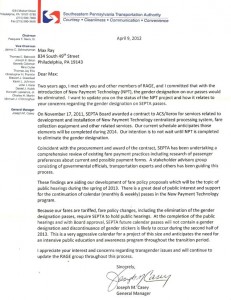SEPTA Says Goodbye to Transpass IDs
After a lengthy grassroots campaign by Riders Against Gender Exclusion (RAGE), SEPTA said yesterday that it would remove gender stickers from all monthly transit passes by 2013. A fare policy proposal will be submitted to SEPTA’s board of directors that includes this change beginning in the second half of next year, says RAGE.
SEPTA General Manager Joseph Casey has said that the stickers would be phased out when the new fare card system went into place, but according to a letter he sent to Max Ray this week, SEPTA will eliminate the gender IDs sooner after almost three years of protesting them on the grounds that they discriminate against transgender people throughout the region.
“We are so thrilled to have won this historic victory for transgender and gender non-conforming SEPTA riders,” Max Ray, a founding member of RAGE, tells us exclusively. Ray has been keeping us updated about this campaign for the past year. “We won this victory by bringing together riders of all genders to take action demanding SEPTA and City Council recognize our right to safe and accessible public transit,” he says. “We are pleased SEPTA followed the lead of the trans community, their riders, their own advisory boards and City Council in recognizing the need to remove the stickers.”
It was Charlene J. Arcila who first brought the issue to bear when she filed a complaint with the Philadelphia Commission on Human Relations over the gender ID system. From that point, RAGE was formed and began collecting thousands of signatures from transgender riders and allies throughout the region.
RAGE members met with SEPTA’s Casey and even held a drag show in a SEPTA station, collecting stories of discrimination, and disrupting a SEPTA public hearing in order to read their Rider’s Bill of Rights and ask SEPTA officials to end the ID system.
“This decision by SEPTA is so important to transgender riders who daily faced discrimination and risked their own safety just to ride the bus to where they need to go,” explains Ray. Incidents of violence and discrimination have been widely reported by transgender transit pass users. And this has been going on since the 1980s when SEPTA first introduced the stickers to prevent people from sharing the passes.
Unfortunately, the system has long made riding public transit difficult for transgender and gender non-conforming riders in the Philadelphia area. Riders whose gender expression does not match the sticker on their pass – transsexual men and women who are not living in one gender full-time, and genderqueer people who do not present themselves as distinctly male or female – have been harassed by drivers, outed as transgender to other riders, putting their personal safety at risk. Some say they have even had legitimate passes confiscated.
“We thank SEPTA for doing the right thing,” says Ray. “New fare system delays may be unavoidable, but SEPTA realized that human rights can’t wait. I’m proud of the tremendous amount of work that the transgender community has put into this project and all we’ve accomplished during this campaign.”
Much has come from the grassroots effort this year alone – including an awareness of trans issues in City Council, which recently passed a resolution spearheaded by Councilwoman Blondell Reynolds-Brown calling on SEPTA to end the gender sticker policy. RAGE also began a large membership drive, including a direct invitation to Casey to become a member of RAGE. And the group’s official membership has swelled to more than 400 card-carrying members who are stepping up to report incidents of gender-based harassment and to be visible allies to transgender riders.
Because SEPTA’s fares are tariffed, fare policy changes such as removing gender stickers from passes require SEPTA to hold public hearings. These hearings, which were outlined in that letter sent to Max Ray by Joe Casey on April 11, are planned for Spring 2013. SEPTA expects that the gender stickers will be removed during the second half of 2013.
“The oppression that transgender people face in our society can make us feel powerless, it can make us feel like victims,” says Nico Amador, a founding member of RAGE. “We hope that this victory can be a symbol for other trans people that we don’t have to wait for other people to change systems for us, we have the power to organize and create the changes ourselves.”



